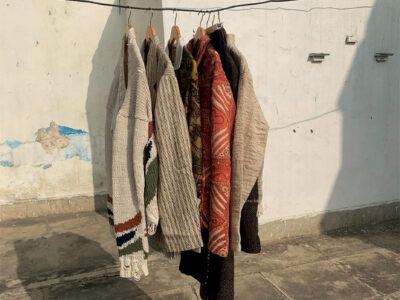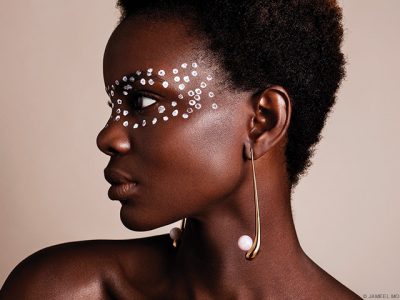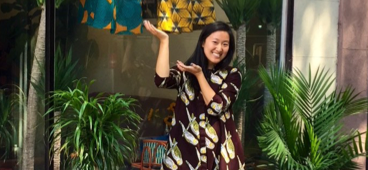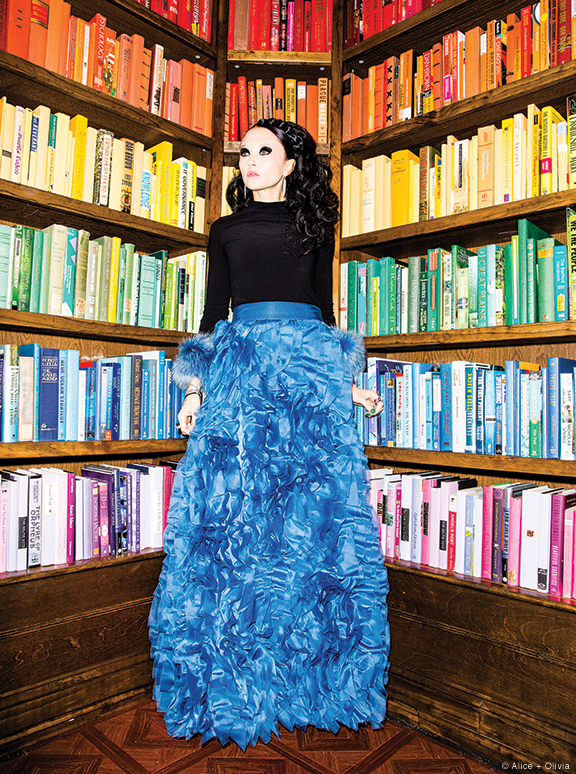
Designer Stacey Bendet C’99 has built a global brand that is colorful, fun, and welcoming for women—and a fashion business strong enough to thrive in an unforgiving competitive environment.
BY ALYSON KRUEGER | Photos Courtesy Alice + Olivia
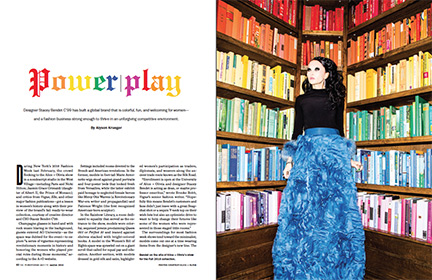
During New York’s 2018 Fashion Week last February, the crowd flocking to the Alice + Olivia show in a nondescript studio in the West Village—including Paris and Nicki Hilton; Jazmin Grace Grimaldi (daughter of Albert II, the Prince of Monaco); and critics from Vogue, Elle, and other major fashion publications—got a lesson in women’s history along with their preview of the brand’s fall ready-to-wear collection, courtesy of creative director and CEO Stacey Bendet C’99.
Champagne glasses in hand and with rock music blaring in the background, guests entered AO University—as the space was dubbed for the event—to explore “a series of vignettes representing revolutionary moments in history and honoring the women who played pivotal roles during those moments,” according to the A+O website.
Settings included rooms devoted to the French and American revolutions. In the former, models in foot-tall Marie Antoinette wigs stood against grand portraits and four-poster beds that looked fresh from Versailles, while the latter exhibit paid homage to neglected female heroes like Mercy Otis Warren (a Revolutionary War-era writer and propagandist) and Patience Wright (the first recognized American-born sculptor).
In the Rainbow Library, a room dedicated to equality that served as the entrance to the show, models wore colorful, sequined jerseys proclaiming Queen 001 or Perfect 10 and leaned against shelves stacked with bright-colored books. A model in the Women’s Bill of Rights space was sprawled out on a giant scroll that called for equal pay and education. Another section, with models dressed in gold silk and satin, highlighted women’s participation as traders, diplomats, and weavers along the ancient trade route known as the Silk Road.
“Enrollment is open at the University of Alice + Olivia and designer Stacey Bendet is acting as dean, or maybe professor emeritus,” wrote Brooke Bobb, Vogue’s senior fashion writer. “Hopefully this means Bendet’s customers and fans didn’t just leave with a great Snapchat shot or a sequin V-neck top on their wish lists but also an optimistic drive to want to help change their futures like some of the women who were represented in those staged little rooms.”
The surroundings for most fashion week shows tend toward the minimalist; models come out one at a time wearing items from the designer’s new line. The focus is on the fashion. Bendet, however, stages elaborate displays that feel more like theatre. She places her models in scenes she has envisioned and has spectators meander through them, feeling like they are part of the action. “Her presentations are often elaborate stagings that transport guests to places both whimsical and far-flung,” wrote Andrew Shang of Women’s Wear Daily. The settings also share messages of hope or activism.
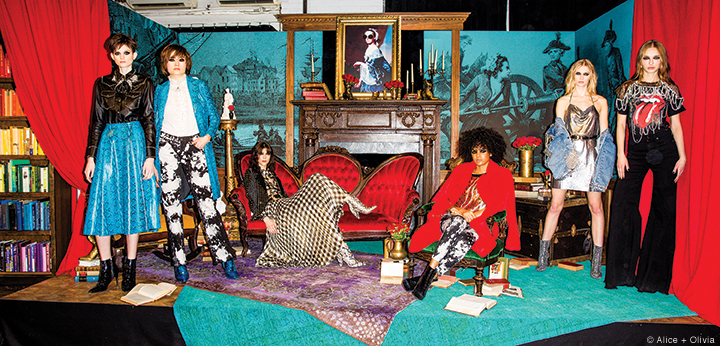
As a designer, Bendet strives to make women feel not just happy but empowered. “When you think about 10 or 20 years ago, fashion was, you walk into Madison Avenue and you never felt quite good enough to be there; you felt like a lesser woman, so you wanted to buy more,” she says. “I’ve always taken the opposite approach: make a woman feel welcome and comfortable and make her walk out feeling even better.”
It’s a philosophy that has worked. Since launching in 2002, Alice + Olivia has grown to operate boutiques in 27 cities around the world, from Greenwich, Connecticut, to Chengdu, China. Customers can buy the brand at 800 department stores worldwide, including some of the most prestigious. Saks Fifth Avenue in New York, Harrods in London, and Galeries Lafayette in Paris all carry her collections. Alice + Olivia is estimated to be worth at least $200 million, according to Forbes contributor Jenna Abdou, who also runs a podcast on changemakers and entrepreneurs.
The company opened two new stores in 2018 (one in Miami and one in Southampton, England) and has added staff for planned growth in Asia.
Celebrities including Gwyneth Paltrow, Katy Perry, and Sarah Jessica Parker have all been spotted in Alice + Olivia clothing. Hillary Clinton uber-aide Huma Abedin, businesswoman Randi Zuckerberg (formerly of Facebook), and actress Tallulah Willis (daughter of Bruce Willis and Demi Moore) all gave interviews about their careers for a section named “AO Boss Babes” on the company website.
Former first lady Michelle Obama wore the brand multiple times, including a mid-calf floral skirt at the Turnaround Arts Talent Show at the White House. “If Michelle Obama has worn your clothes, it’s really great,” says Nancy Deihl, director of the Costume Studies MA Program at New York University. “She had such a wonderful way of promoting American fashion and doing it in a really striking way… you want your brand to be an example of that.”
Bendet has become a fashion role model herself, known for dramatic eye makeup and colorful ensembles. In 2014 she was inducted into Vanity Fair’s International Best-Dressed List Hall of Fame, lauded as “the inimitable retail tycoon,” along with fellow honorees the “peerless” creative director and artist Karl Lagerfeld and “the incomparable HRH the Duchess of Cambridge,” Kate Middleton.
In addition to lifting up women by dressing them in clothes that make them feel good, Bendet has also become a strong advocate for equal pay and other forms of support for women in the workplace. Last year she released a limited edition T-shirt to raise money for the Global Fund for Women. And she’s also been active on these issues as a board member of the Council of Fashion Designers of America (CFDA) and of the Wharton School’s Jay H. Baker Retailing Center.
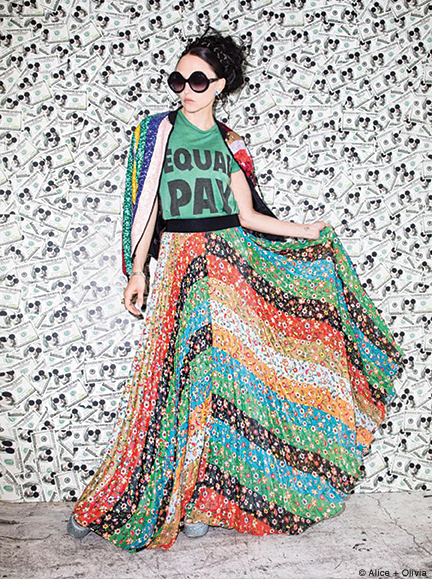
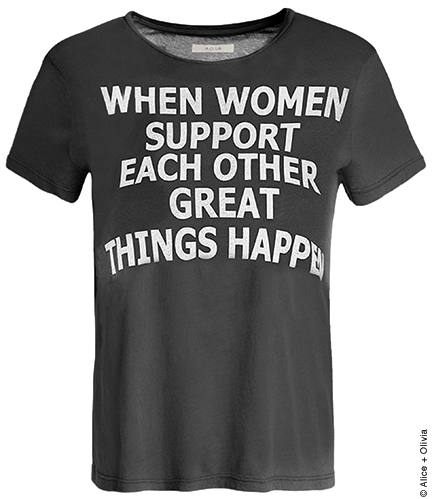
“She’s made us much more aware,” says Mina Fader, the Baker Center’s managing director. “She’s helping us figure out which issues to advocate for more widely.”
Bendet also returned to Penn last April to be the keynote speaker at the annual Penn Fashion Week, sponsored by the Baker Center, which bills the gathering as “the Ivy League’s premier fashion event, with fashion fêtes, industry panels, lectures, and a student-produced fashion show.” Bendet shared stories about her time at Penn, what it means to be a designer, and how she pursued that career with participants gathered in Steinberg-Dietrich Hall. “She let students and everybody know that there is a real career path available from Penn, from Wharton, to think about the creative side of the world, to start businesses in fashion,” says Fader.
Bendet’s and Alice + Olivia’s success has taken place in a generally challenging business environment for fashion. “The apparel business is very, very difficult right now,” says Mark Cohen, director of retail studies at Columbia University’s business school, pointing to the competition for women’s spending from other categories such as technology and a trend toward casual clothes and basics, and away from elaborate designs. “There have been businesses in the past that have been a gleam in someone’s eye that came to market [but] the marketplace isn’t looking for that right now.”
Bendet was 20 years old and participating in a study-abroad program in Paris when she realized exactly what her company would stand for one day.
She had been interested in fashion all her life. She grew up in Chappaqua, New York. “It was the tiniest little town in Westchester,” she says. “We went bike riding, we walked to school, we played outside on the rocks.” Her father owned a textile importing business, and as a young girl she took scraps away to make clothes for her Barbie dolls.
When she grew older she made clothes for herself. Like a lot of kids, she ripped holes in her jeans to make them fashionable—but unlike them, when she was 13 she sketched a design for her Bat Mitzvah dress and took it to the pattern-maker to have it made. “It was beaded lace, and it was this little shift with a little matching jacket,” she told BuzzFeed for the website’s “How I made it in fashion” series. “You take those pictures when you’re 14 or 16 or whatever, and you’re like, ‘What was I thinking?’ And I look back at that dress, and I think it was cute and elegant.”
So when she had the opportunity to live in Paris for a semester as a college student, she couldn’t wait to spend time exploring legendary fashion houses. She even had money to buy a few items of her own.
But when she walked into a Louis Vuitton store to buy a rolling suitcase, the experience was less fun than she imagined. “I was all excited, and I went in there to go get it, and the salesperson was so rude to me—I guess because I was just a kid. I felt so miserable,” she says. “I remember thinking, ‘If I have a store one day, I will never make anybody feel like this. Any woman who walks into my store will feel great and welcome.’”
If her time in Paris solidified her retail philosophy, her classes at Penn gave her business knowledge.
In a reversal of the classic parent-child argument, her father wanted her to study art in college, telling her, “You have the rest of your life to deal with business.” She ended up majoring in international relations but took a number of Wharton courses along the way, starting with Finance 101 and working her way up to entrepreneurial management classes where she studied alongside MBAs.
She recalls one assignment in which her team had to figure out how to import a type of Bolivian alcohol into the United States. “I remember saying to the other people in the group, ‘We can think of a zillion reasons we can’t import the alcohol, but let’s come up with five reasons how we can do it,’” she says. “I think I realized when I took that class how driven and focused I was. If I had a goal I would meet it.”
Barbara Kahn, the Patty and Jay H. Baker Professor of Marketing, whose research specializes in retail, attributes the success of a fashion company to three things. “It’s hard work, it’s talent, and it’s a bit of luck,” she says. Bendet had all of them.
It all started when the designer—by then a couple of years out of Penn and working for a company that built websites—saw a striped upholstery fabric in a store window while walking around in New York. “It was 2002 and everything was denim, denim, denim,” she says. “I was like, ‘I want pants, I want crazy, fun pants.’”
She bought the fabric and turned it into bell-bottom pants, which were popular at the time. While she was wearing them in Los Angeles, a woman stopped to admire them. She turned out to be Lisa Kline—owner of a trend-setting boutique favored by celebrities—who commissioned 20 pairs on the spot.
Bendet made more pants with different styles (she hand-painted some) and staged a party in New York’s fabled Russian Tea Room to show them off to merchandisers. Knowing she had to do something bold, she commissioned socialites including Paris Hilton and Devon Aoki to model the pants topless. Barneys New York placed a large order.
She captured the attention of Andrew Rosen, the cofounder and CEO of clothing retailer Theory, who was slowly investing in contemporary, ready-to-wear brands that he believed were changing American fashion. Condé Nast artistic director and longtime Vogue editor-in-chief Anna Wintour once called Rosen the American equivalent to LVMH, a multinational conglomerate and self-styled “world leader in luxury,” which gobbles up smaller companies and helps them expand.
Rosen invested in the company and still owns it with Bendet; but, also, “he gave her advice, he gave her contacts,” says Kahn. “It makes a big difference if you have that type of support.”
Her timing was also right. When Alice + Olivia started there really weren’t that many options for women who wanted to look fashionable but couldn’t afford couture. The designer stood out by creating clothes that are lively, distinct, and alluring.
“For the past five or so years people have been walking around in yoga pants, boring basics,” said Deihl. “Alice + Olivia, it really does have its own personality. You can count on the brand for beautiful surface treatments, beautiful prints. It has this feel … that you are going to be happy when you put it on, and you are going to go through your day really confident in what you look like.”
Deihl likens Bendet to Coco Chanel or Donna Karan—designers who made bold clothes that customers not only enthusiastically wore but kept. “Her stuff is going to make the cut in your closet. You’ll wear it, and then put it away and revisit it. You’ll think it’s still original, still special,” she says. “I think that’s where she sits, and it’s a fantastic place to sit.”
Tiffany Yannetta, a New York-based fashion writer and editor, agrees about the style standing out. “The line is quirky, playful, and girly … I think the brand has done a really good job at solidifying an aesthetic, and really leaning into it.”
Whether intentionally or not, Bendet has also branded herself as a strong fashion personality at a time when the world is beginning to focus more on female power. Early on she made herself the face of her company, someone with whom customers could admire and identify. She put her name on the brand, making it Alice + Olivia by Stacey Bendet. Alongside the logo, she added a cartoon version of herself on her clothing where she is wearing big glasses and exaggerated eye makeup.
She ramped up her media appearances, doing interviews for Vanity Fair, BuzzFeed, the Inside View. She made her own Instagram handle the same as the company’s with the tag line: “Alice + Olivia designer, mommy, wife, occasional haiku-ist, and lover of all things colorful.” As of early December, it had 871,000 followers.
“I think today’s customer, they want to have the whole story,” says Deihl. “They want to know who is behind it, who are you supporting by buying their clothes? Stacey embodies the brand and seems like a good person to put your style life in her hands.”
Columbia University retail expert Mark Cohen is more skeptical about the impact of Bendet as a fashion role model on the company’s bottom line. Yes, she might be on Vanity Fair’s best dressed list, he says, but the magazine doesn’t count much as an arbiter for the general public these days. “That is a niche brand, and there could be very little that she sells to the Vanity Fair customer that appeals downstream.”
Bendet uses her fame to promote causes she cares about, mainly issues affecting working women. One of her favorite slogans is, “Every day is women’s day.” She regularly talks about having three daughters and a company that employs 400 women.
She also points to her company’s maternity policy, which includes eight weeks of paid leave that employees can spread out as they like. For example, some new mothers would rather work part time for a longer period than take off completely for the eight weeks and have to catch up later. (The National Partnership for Women and Families says only 15 percent of workers in the US have access to paid family leave through their employers.)
On April 4, 2017—National Equal Pay Day—Instagram was rife with celebrities like Jessica Alba showing off their Alice + Olivia green T-shirts proclaiming Equal Pay in bold, black font. This was part of the company’s Communi-T initiative, in which it released limited-edition shirts to raise awareness and money for issues. Ten percent of the proceeds from the Equal Pay edition went to the Global Fund for Women. Other versions that have been released at various times had slogans likeChamp, for championing women, andWhen women support each other, great things happen.
Bendet is also active in various organizations, raising money for the Good+ Foundation, which provides items like diapers and cribs to families in need, and advocating for female empowerment programs through the CFDA, for example.
“I’m not sure every consumer in the market cares about being politically or socially aware,” says Tyler McCall, deputy editor of Fashionista.com. “But I think the kind of woman Stacey is courting care, and they are happy to see that she’s equally engaged.”
Numbers back up this sentiment. A 2017 study conducted by Cone Communications, part of the Porter Novelli media group, found that 87 percent of consumers said they’d purchase a product because a company advocated for an issue they care about.
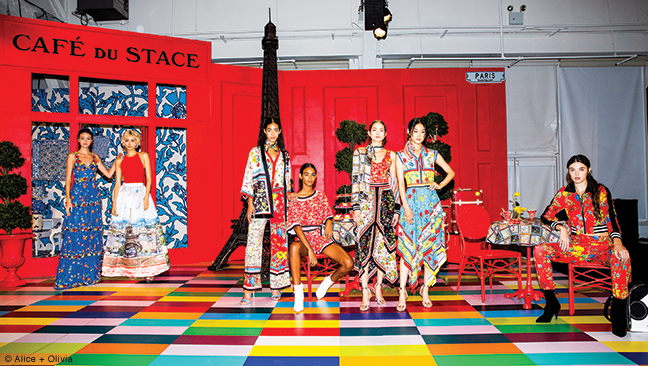
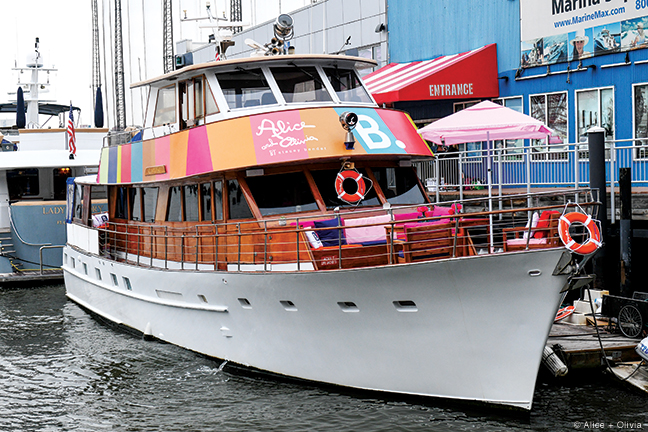
Cohen says the best way to see where female fashion is going is to look at what travelers are wearing in an airport. When I tried it, I saw mostly black leggings, white T-shirts, and fashionable sneakers.
“There is a casualization of our country, which is something that started a long time ago and is now in full swing,” he says. “Customers don’t even dress for special occasions anymore. Look at weddings—people dress like they are going to the beach. Even Kate Middleton re-wore a dress to Prince Harry’s wedding. That would have been implausible 10 years ago.” He notes that women are also spending money on other categories, like technology and experiences, rather than on their outfits.
It is in this climate that Alice + Olivia and other fashion brands are trying to survive and grow.
Some of them are trying to adapt to the new style, says Deihl. “When I see Balenciaga doing sneakers now, it’s so sickening,” she adds. “They used to be in a different realm … they used to have a certain image, and they stuck to it, they didn’t just shift with every season and whatever the reception of the marketplace was.” And some once high-flying brands, from New York-based designer Bibhu Mohapatra to British brand Jaeger, have filed for bankruptcy.
For now at least, Bendet is continuing to succeed with what she knows best: festive, somewhat over-the-top clothes. She’s already captured the market of the remaining people who want to dress up, says Kahn. “If you want to wear something special, I could imagine you were going to Stacey.”
But Bendet obviously doesn’t want to coast; she wants to grow. How that will happen remains a question. One possibility is being acquired by a larger entity. Other paths involve expanding into new markets or introducing additional product lines such as accessories, shoes, beauty products, decor, and home. All present risks.
Bendet is looking to launch a beauty line in the next three to five years. “The brand is so much about female empowerment, femininity, and making a woman feel her absolute best,” she says. “I think a big part of that is the beauty component.”
“I can see A + O going the Kate Spade route and venturing into decor, home, and other lifestyle accessories,” says fashion writer and editor Yannetta. “I’m kind of surprised they haven’t yet, to the best of my knowledge.”
McCall says she thinks the company will try to grow in accessories, “which are a sweet spot for brands like Alice + Olivia.”
But Kahn points out that the company tried to branch out into purses and handbags, only to later discontinue those lines when customers failed to respond. “That is an example of something she tried that didn’t work,” she says. “It is risky to expand into different product lines.”
One option Bendet is already pursuing is expanding into new markets. “Right now we are really growing globally,” she says. “We are opening all these stores in Asia. We are expanding that growth. We are expanding our digital growth.”
Kahn sounds a note of caution. “If you take on too much debt or you overextend, and the demand isn’t there, it’s a problem, but she seems to be very careful,” she says. “She doesn’t pretend to be the smartest person in the world; she turns to others for business advice.”
Bendet doesn’t seem to be attracted by the prospect of selling the company. “If you look at these female-led companies that are doing super well like Tory Burch and Stella McCartney, they are all doing different things,” said Kahn. “Tory and Alice + Olivia are still independent but Stella was acquired. That has a big impact on a brand.”
Bendet has a reputation as a fierce individualist and has never been afraid to buck tradition to add some spark and pizzaz to a fashion environment that needs it. She may invent a different path forward altogether. As Fashionista.com’s McCall puts it: “She has a highly-feminine aesthetic with a rock ’n’ roll edge.”
“When you go into an Alice + Olivia store, you can see the clothes embody her personality: her bright colors, her patterns, her happiness, her brightness, her cheery personality,” adds Wharton’s Fader. “She’s fabulous and she’s strong and knows how to advocate.”
Whatever the future holds, for now Alice + Olivia looks strong.
“If it’s been around for a long time, it’s probably making money. If it has a niche in the marketplace, it’s probably stable,” says Cohen. “Is it placed in retail outlets that consistently support it? Does it have a marketing presence, so you don’t just see it once and never see it again? You have to look at manifestations of longevity to infer success.”
In September, Bendet unveiled her newest Fashion Week extravaganza, billed as a “Passport to Wonderland” and featuring a yacht docked on the Hudson River at Chelsea Pier 59.
“I keep saying the world has become so divisive,” she told an audience that included Katie Holmes and Caitlyn Jenner. “We need to do things that make the world feel more connected.”
She produced vignettes that represented her favorite places around the world, from Marrakesh, Morroco, to Positano, Italy, to Tokyo. Models at the Careyes section, inspired by a luxury resort in Mexico, wore black dresses and jackets with bold colored flowers. At Cafe du Stace, the Paris exhibit, one model was wearing a long skirt imprinted with an Impressionist-style image of the Eiffel Tower.
But the highlight may have been the yacht itself. At first glance it just seemed part of the show. Arranged on the deck was bright pink, orange, and red furniture set underneath a large soft pink umbrella with frills coming off the sides. Inside was a library with velvet couches and shelves holding books of every color.
But in a first for the fashion world—the province of extravagance and elitism—as part of a promotion with the hotel reservations website Booking.com, the yacht was actually available for anybody to reserve a stay for three nights during New York Fashion Week—at a budget-conscious rate of $59 per night! A gimmick? Maybe, but also a gesture toward Bendet’s goal of making fashion available to all. “Fashion has begun to shift away from that world of inclusion,” she says. “We’re going back to that.”
Alyson Krueger C’07 writes frequently for the Gazette.


